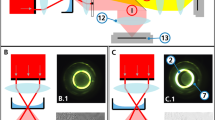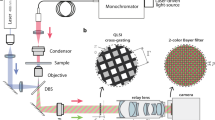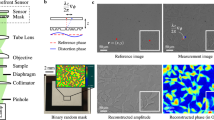Abstract
PHASE-CONTRAST effects occur when the paths of the dioptric and diffracted rays between object and image differ sufficiently to produce some degree of interference. Were it possible to polarize the diffracted rays and dioptric rays at right angles to one another, a path difference could be introduced by passing them through a birefringent screen, the refractive index of which, being different for two perpendicularly polarized rays, would produce the effect of different optical thicknesses accordingly. Such a screen might be a mica plate causing a fixed difference of a quarter of a wave-length, or a compensator of the Babinet–Soleil type producing a variable difference.
This is a preview of subscription content, access via your institution
Access options
Subscribe to this journal
Receive 51 print issues and online access
$199.00 per year
only $3.90 per issue
Buy this article
- Purchase on Springer Link
- Instant access to full article PDF
Prices may be subject to local taxes which are calculated during checkout
Similar content being viewed by others
Author information
Authors and Affiliations
Rights and permissions
About this article
Cite this article
HARTLEY, W. A Variable Phase-Contrast System for Microscopy. Nature 159, 880–881 (1947). https://doi.org/10.1038/159880a0
Issue Date:
DOI: https://doi.org/10.1038/159880a0
This article is cited by
-
Variable Colour-Amplitude Phase-Contrast Microscopy
Nature (1949)
-
Phase-Contrast in Polarized Light
Nature (1948)
-
A Variable Phase-Contrast System for Microscopy
Nature (1947)
Comments
By submitting a comment you agree to abide by our Terms and Community Guidelines. If you find something abusive or that does not comply with our terms or guidelines please flag it as inappropriate.



